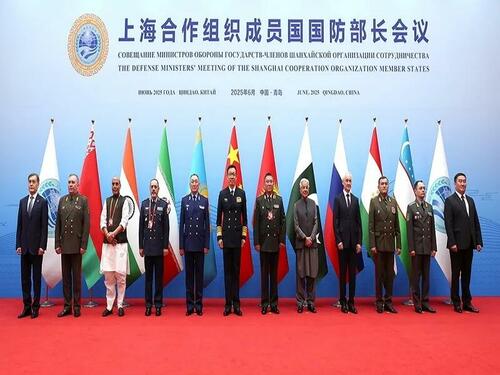Why Couldn't The SCO Defense Ministers Agree On A Joint Statement?
Authored by Andrew Korybko via Substack,
India refused to sign the document since it didn’t condemn late April’s Pahalgam terrorist attack...
India found itself at odds with the SCO once again less than two weeks since it clarified that it didn’t participate in the group’s joint statement on the Iranian-Israeli War.
This time its Defense Minister refused to sign the joint statement that was supposed to conclude last week’s meeting with his peers in Qingdao ahead of the leaders’ summit in Tianjin this autumn.
The reason was that the document didn’t condemn late April’s Pahalgam terrorist attack even though it condemned terrorism in Balochistan.
As this year’s chair, China has extra influence over the SCO’s workings during the events that it hosts, so it therefore follows that this might have been a deliberate provocation meant to signal support for Pakistan while snubbing India.
To add insult to injury, Pakistan blames India for terrorism in Balochistan, which is why it was even more unacceptable from Delhi’s perspective for that issue to be mentioned while no mention was made of the Pahalgam terrorist attack to balance everything out.
India’s conventional retaliation against Pakistan in the aftermath sparked the latest Indo-Pak Conflict between these two SCO members, however, so China or at least its supporters in the media might claim that omitting any mention of Pahalgam was meant to avoid further dividing the group. Be that as it may, it would have been predictable that this would result in India refusing to sign the SCO Defense Ministers’ joint statement, but that might have actually been what China was aiming for all along.
To explain, a perception has taken root among some members of the Alt-Media Community and even some experts that India is the so-called “weak link” in the SCO, with the reason allegedly being its close economic and military ties with the US. Adherents ignore China’s much closer economic ties to the US, the Central Asian Republics’ growing military ones with the West in general (especially NATO member Turkiye), and the US’ attempt to subordinate India, however. It’s therefore an agenda-driven narrative.
Nevertheless, this analysis here from early June argued that it was precisely this perception that accounts for why Russia lent credence to Trump’s claim that he personally stopped the latest Indo-Pak Conflict despite Delhi’s repeated denials, which hyperlinks to related pieces over the preceding month. The gist is that a pro-BRI policymaking faction comprised of anti-Western “hardliners” is rising in the Kremlin at the expense of the establishment’s balancing/pragmatist faction that currently calls the shots.
Although the pro-BRI faction hasn’t been able to effect any tangible shift in policy towards (or rather, away from) India due to Putin being part of the balancing/pragmatist faction, that scenario would be of grand strategic importance for China. Russia and India would no longer jointly accelerate tri-multipolarity processes, thus making it more likely that a form of Sino-US bi-multipolarity could one day be restored. Russia would therefore become China’s “junior partner” while India would become the US’ in that event.
Thus, China might have sought to provoke India into refusing to sign the SCO Defense Ministers’ joint statement so as to craft optics that could lend more credence to the claim of it being the SCO’s “weak link”, hoping that this can strengthen the influence of Russia’s pro-BRI faction. Russian Defense Minister Andrey Belousov effusively praised India during the summit though so no changes are expected under Putin, but if a member of the pro-BRI faction succeeds him, then this can’t be ruled out in the future.
Loading...
